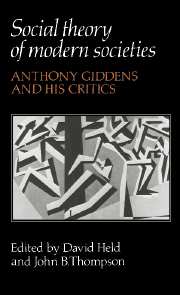Book contents
- Frontmatter
- Contents
- List of contributors
- List of abbreviations
- Editors' introduction
- 1 Social theory as critique
- 2 Hermeneutics and modern social theory
- 3 The theory of structuration
- 4 Models of historical trajectory: an assessment of Giddens's critique of Marxism
- 5 Capitalism, nation-states and surveillance
- 6 War and the nation-state in social theory
- 7 Only half the story: some blinkering effects of ‘malestream’ sociology
- 8 Citizenship and autonomy
- 9 Presences and absences: time–space relations and structuration theory
- 10 Space, urbanism and the created environment
- 11 On the (ir)relevance of structuration theory to empirical research
- 12 A reply to my critics
- Select bibliography
- Index
2 - Hermeneutics and modern social theory
Published online by Cambridge University Press: 24 November 2009
- Frontmatter
- Contents
- List of contributors
- List of abbreviations
- Editors' introduction
- 1 Social theory as critique
- 2 Hermeneutics and modern social theory
- 3 The theory of structuration
- 4 Models of historical trajectory: an assessment of Giddens's critique of Marxism
- 5 Capitalism, nation-states and surveillance
- 6 War and the nation-state in social theory
- 7 Only half the story: some blinkering effects of ‘malestream’ sociology
- 8 Citizenship and autonomy
- 9 Presences and absences: time–space relations and structuration theory
- 10 Space, urbanism and the created environment
- 11 On the (ir)relevance of structuration theory to empirical research
- 12 A reply to my critics
- Select bibliography
- Index
Summary
In contemporary social theory Anthony Giddens occupies a place all of his own. The very volume of his contribution is difficult to match; less usual still is the range and centrality of topics which, with varying degrees of comprehensiveness, he has addressed. Particularly rare is the ambitious intent of Giddens's theorizing; it has been aimed, right from the start a decade or so ago, at nothing less than a critical reassessment of theoretical lore, leading to the articulation of a new theoretical canon for sociology to come. The non-partisan nature of Giddens's partisanship is unique; and the declared purpose of his effort is to integrate, not to divide, and thus to offer notoriously fissiparous sociological theory the unity it never enjoyed before. Giddens's theory has been to date, and promises to remain, a wide and hospitable river which admits and absorbs pure waters carried by each and every mountain spring as well as drawing on ample subterranean currents. For all these reasons, his theoretical work is a radical departure from purposes and practices of sociological theorizing well-nigh universal in recent years. To a considerable number of present-day sociologists, this work is unprecedented in their collective memory: no wonder it attracts widespread attention and gives rise to great expectations. It also invites close scrutiny.
The really close scrutiny Giddens's work deserves is beyond my ability. Giddens's power of synthesis has few equals, but its products are scattered over a large number of writings which themselves demand a synthesizing effort; many a formulation represents a stage in the development of an as yet incomplete theory, and has been (or is likely to be) superseded at some later stage.
- Type
- Chapter
- Information
- Social Theory of Modern SocietiesAnthony Giddens and his Critics, pp. 34 - 55Publisher: Cambridge University PressPrint publication year: 1989
- 26
- Cited by



